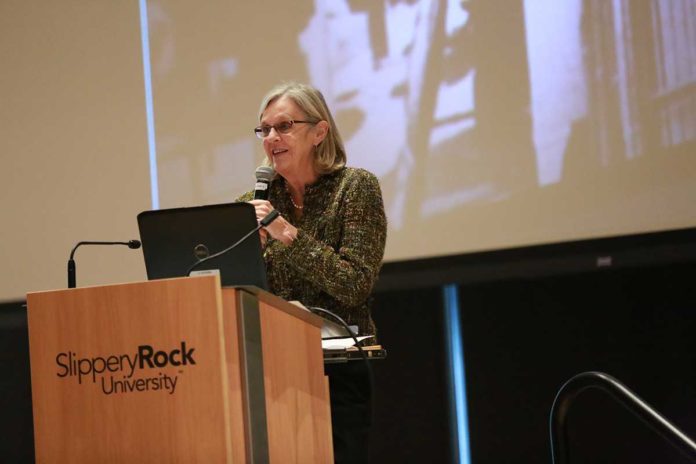The U.S. Holocaust Memorial Museum curator, Susan Bachrach spoke about how people conformed to the Nazi regime after being pressured from peers and the government on Wednesday in the Smith Student Center Ballroom to correlate with SRU’s Holocaust Remembrance 2016 Program.
As the curator of special exhibitions, Bachrach is involved in developing temporary exhibits on various topics that change from year to year. She explained that her job is to develop expertise on the subject matter by digging into the scholarly literature concerning the topic and then to present it.
“One thing about the Holocaust content is that it’s so powerful in itself that even if you aren’t the most powerful and effective speaker, it doesn’t matter because the content will carry you,” Bachrach said.
“Some Were Neighbors” is Bachrach’s newest exhibit at the Holocaust museum which discusses how members of societies and governments could have committed such horrifying acts towards individuals and groups of people.
She explained that if the circumstances are right, many of us, although we don’t wish to admit it, could have the capacity of doing something malicious as well.
Bachrach explained that an important aspect for her is knowing what she wants her audience to take away from her speech and the big picture that she wants them to remember.
“I think the most important point of the speech is that people who participated in the Holocaust actively or ones who facilitated it by not speaking out or tolerating what they saw were human beings just like us,” Bachrach said.
Bachrach’s speech revolved around the powerful idea that even though people face an immense amount of pressures and it is often difficult to have morals and fight against it, people also have a choice in the face of risk and temptation.
“The point that the Holocaust demonstrates is that evil things are done by human beings like ourselves and we have the ability to overcome it,” Bachrach said.
Freshman integrated marketing and communications major Marissa Yohe said that the Holocaust really interests her, so when she heard a speaker was coming to campus, she was looking forward to it.
“The presentation made me realize that everyone makes their own decisions, but with the way society has taught people to conform, it is very hard to go against the norm,” Yohe said.
The speaker attracted a wide variety of listeners that all came for different purposes, whether it was for a class or to educate themselves more.
Senior marketing major Kallie Rogalsky was in attendance alongside the special guest of the evening, her grandmother, who represented their family members who lost their lives during the Holocaust.
“This presentation hit home because my family on my father’s side is Jewish and I have a great uncle that is a Holocaust survivor,” Rogalsky said.
Bachrach explained that there are common misconceptions of the Holocaust from what she has learned from museum visitors, and she aspires to shake up the popular fallacies in this exhibit.
“There are pressures to defer to authorities, to conform to peers within communities, social pressures or to get ahead in one’s career, and people don’t realize all of these factors,” Bachrach said.
Yohe said that the videos of the people shown who actually experienced the Holocaust were powerful because it made the speech much more realistic and added emotion to the presentation.
With an enormous turnout, Bachrach said that it’s very rewarding for her to face a big challenge when she starts on a project and to see it through all the various stages to the conclusion.
Rogalsky said that she learned a lot from the speech and it made her more conscious of her actions now and her actions going forward as well.
Bachrach left her audience with an influential question: does one take the easy way out or summon a little courage and integrity to do the right thing even though it may be difficult?
“I hope I provoke the listeners into thinking in a slightly different way about this topic and maybe I will reach someone who wants to learn more beyond this speech,” Bachrach said.







